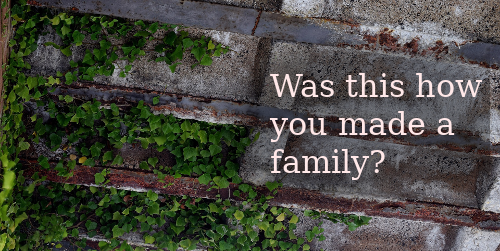Season notes: autistic shutdown, internalized ableism

Kyawtchais would have liked to spend more time with Lefeng — ‘mud’ her hands shaped the name. One day ey would need to ask Lefeng how ey got such a name. It almost made ‘kyawtchais’ seem normal! Especially with Lefeng’s words for the deadfire — friend-at-night, guide, beautiful — still tangled in eir thoughts.
But there was no time. Later, perhaps.
Lefeng and the gruff-one headed out shortly after Kyawtchais arrived, due at the city yards for day labour. Once they left, Kyawtchais and the silent-one worked on the house-to-be, and the small-one, once-weaver, once-and-again-parent worked to expand the gardens.
Kyawtchais tried not to notice how the silent-one had not gifted eir name, had said nothing about Kyawtchais’ courtship. Watchful-Lefeng had welcomed em, seen something in em that no one else had before. Kolchais had said what was proper but made it clear in many ways ey wanted Kyawtchais to be a part of the family. That one prospective spouse did not wish to be known… Ey refused to allow it to sadden eir in the face of so much hope.
The small-one’s name Kyawtchais remembered from before, but from courtesy kept it from eir mind. It had been a hand of years and more since the fire destroyed the ColorworkWeavers. Kyawtchais’ almost-completed courtship with the ColorworkWeavers near-adults had no meaning with this new family.
Still, it was a joy to see the once-weaver, Trial Grandparent, again. Ey was all Kyawtchais had left of the family ey had once meant to join. Once the ColorworkWeavers were no more, Kyawtchais had no call on the Grandparent, and custom required ey keep eir distance. But ey was back now, and it made eir hands flutter and feet bounce to look across the yard and see eir once-and-again parent-to-be (Maybe. Hopefully. May the currents bring them to a happy destination) working in the garden as ey had done before their mutual loss.
Kyawtchais could not watch the small-one much, though. A new stack of wattle had been delivered the day before. One at a time, the flexible branches had to be woven between the sturdier posts. Ey and the silent-one would build up one section, then move over and build up the next section. While they wove, Kolchais would detangle another wattle branch from the pile and bring it to where they worked. Sometimes, the wise-one would bring water instead of wattle, and they would stop and drink, and Kyawtchais (in eir head, eir hands shaped ‘tree-fire’) would wash ey hands clean of grit and bark pieces.
They said little as they worked, falling into a steady rhythm. Weave the wattle at an angle, low into the already built-up section, high and loose on the other side. In-out, in-out, in-out until you ran out of wattle. Push it down, making it interweave more deeply with the built-up side, push and push and push until it was tightly pinned between the posts. Another wattle from wise-Kolchais, out-in, out-in, out-in. Push and push, and push and push. In-out, in-out, in-out, push, and push and push.
It soothed Kyawtchais, the rest of the world fading out as it did when ey was spinning. Out-in, out-in, out-in. Drink, rinse, push, and push and push.
Eir mind drifted, the small-one and child spoke while they worked. On the street outside the gate, people passed by, there was nothing else to hear. The scraping of the wattle bark and the harshness of eir and the silent-one’s breathing drowned out any quieter sounds from the neighboring compounds.
In-out, in-out…
Who were those compounds? The small-one should know. Was there a custom for meeting new neighbors? Or was it best to ignore them?
The neighbors around the Silent Spinners compound were friendly but kept their distance. After so many generations, they might have learned that the Spinners were different, not contagious.
Out-in, out-in, out-in…
Was this how you made a family, weaving together different pieces to make a new thing, yet each piece remained its own thing?
Or was it more like spinning, where when you were done you couldn’t pick one piece of fiber from the next?
Ey had learned weaving from eir lost spouses-to-be. There was a word for the threads that went back and forth. The weft. If the people who made the family were the weft, then what was the warp? The loom? The shuttle?
Surely the current would be the spindle, as it spun them round, twisted them tighter and tighter. But which current was it? From where did it come?
Push and push and push…
Kyawtchais was startled out of the rhythm — and eir thoughts — when another set of hands appeared, calloused and age-spotted. The gruff-one, strong-one, frightened-one, had taken an end of the wattle. Ey and Lefeng were back, and the sun was behind the walls of the compound.
Kyawtchais had missed the market. It was a strange feeling to be in a different place as the sun sank and the light changed, but the market was too stressful when ey was focused on forging new relationships. And ey needed time to truly cement eir chance with this new family.
“Dinner soon,” the gruff-one said. “Finish, and we’ll eat.”
They finished raising that section — the entire house-to-be now had walls to the height of eir knees — and Kyawtchais gratefully stood and stretched eir back. Spinning was not idle work, but a full day at the walls used more and different muscles than Kyatchais was used to.
That, too, was like creating a family.
Together, Kyawtchais went with the gruff-one and silent-one to the outside hearth, and dinner.
Leave a Reply